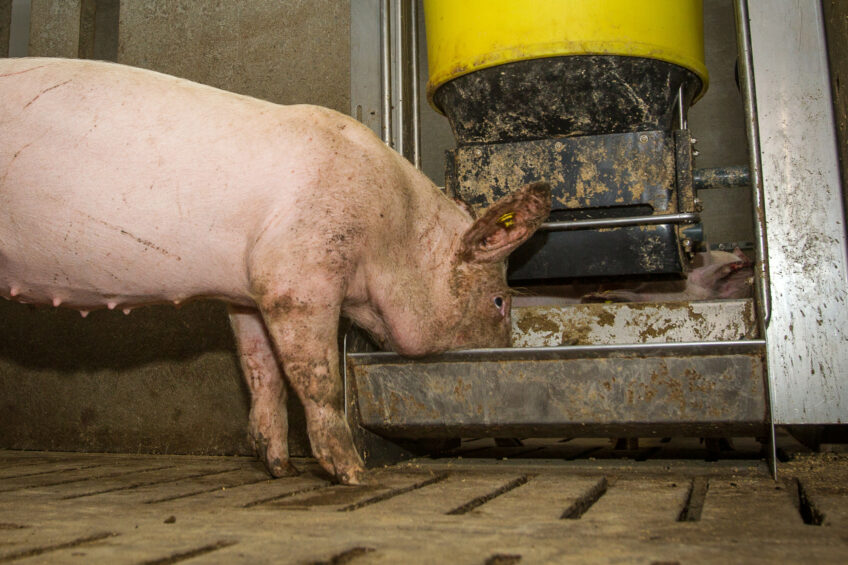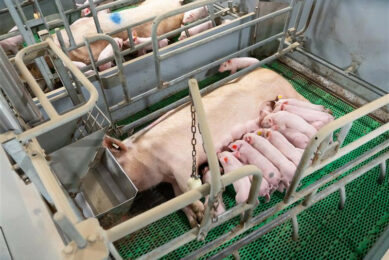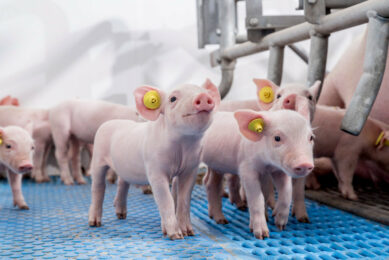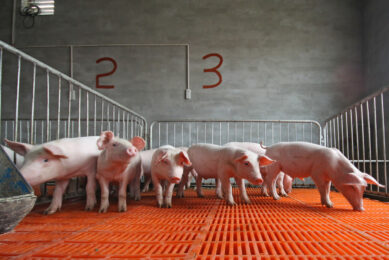Insect products as health promoter in pig feed

Microbial infections and heat stress can negatively impact animal health and welfare. Veterinary antimicrobials are commonly used to treat these infections, but their use can lead to antimicrobial resistance. So alternative solutions are needed to improve animal health and immunity with insect products showing promising results.
The use of insects as a sustainable animal feed material has gained interest due to their nutritional benefits and functional components. Since 2017, Wageningen University and Research (WUR) has been supporting research on the health benefits of functional components from insects in poultry. Part of this research involved literature reviews that revealed that insects contain 4 functional components in particular: chitin, chitosan, lauric acid and antimicrobial peptides.
Insects such as the black soldier fly larvae are rich in these components, which have proven antimicrobial effects. These can potentially reduce infections in livestock, thus providing an alternative to veterinary antimicrobials and addressing AMR. 2 Dutch Public Private Partnership projects financed by the Ministry of Agriculture and industry partners ABZ Diervoeders, Cargill and Protix have been conducted by Wageningen Livestock Research to investigate the health benefits of black soldier fly larvae (BSFL) meal on poultry and piglets. The projects focused on reducing microbial infections and heat stress to promote animal health. 2 in vivo studies in poultry, and an in vitro study in piglets, were conducted to examine the effects of BSFL meal, oil and puree on animal health.
Reduction of microbial infections and heat stress
An in vivo study focused on broilers affected with Coccidiosis and infected with Clostridium perfringens, the causative agent of necrotic enteritis (NE). BSFL meal was used to replace up to 10% of the soy in the broilers’ feed. While the insect meal did not prevent NE or alleviate its symptoms, it did support the recovery of infected broilers, compared to the control group of broilers that consumed soy instead of insect meal. Between 14 and 21 days, NE-challenged broilers fed with 10% BSFL meal showed the best feed efficiency in terms of Gain-to-Feed ratio, compared to the challenged broilers in other treatment groups.
Microbial infections caused by Escherichia coli are common in piglets. 2 studies used an in vitro model simulating the gastrointestinal (GI) tract of piglets to introduce E. coli and simulate infections. In these studies, BSFL puree was added to the feed at different concentrations. The first study observed a decrease in E. coli growth, suggesting that the insect puree has antimicrobial properties compared to feed without BSFL puree.
This result, however, was not confirmed in the second study, probably because the stomach was not included in the colon fermentation simulation model. The antimicrobial properties of the insect puree, combined with the lower pH in the stomach, appear to be responsible for the decrease in E. coli infection.
BSFL protein
Another in vivo study on broilers investigated the potential beneficial effects of the bioactive compounds of BSFL on broilers under heat stress conditions. This study evaluated BSFL protein (5%, 10%) and oil (2%, 4%) in broiler diets under cyclic heat stress or thermoneutral conditions. Male broilers were monitored for growth, carcass yield, and physiological stress markers. Heat stress led to reduced average daily feed intake and trends toward lower average daily gain and body weight. The stress conditions were confirmed by some biomarkers. BSFL oil inclusion under heat stress showed a trend toward improved feed intake, daily gain and body weight. BSFL protein inclusion under heat stress showed a numerical decrease in body weight. Overall, insect products did not lead to any significant benefits in broilers under heat stress conditions.
Impact on animal health and welfare
The studies suggest that BSFL meal and puree have potential antimicrobial effects and can support the recovery of infected animals. The project highlights the potential of using BSFL meal and puree as feed material to improve animal health, which may reduce the need for veterinary antimicrobials. Improved health and reduced infections in poultry and piglets lead to better animal welfare and productivity. Healthier animals experience less stress and discomfort, enhancing their overall well-being and growth performance.
Insect industry and sustainability
The production of insect-derived ingredients requires less land and water than the cultivation and production of traditional feed ingredients such as soy and it produces fewer greenhouse gas emissions. However, what is special about insect ingredients is that insects can be grown on organic by-products, transforming low-value waste into high-quality feed. This can help reduce the world’s waste problem, support a circular economy and reduce competition between resources for animal feed and human food production.
Therefore, using insect and insect-derived ingredients enhances environmental sustainability and resource efficiency. To increase the impact and competitiveness in costs compared to traditional feed ingredients such as soy upscaling of insect farming is required. For this purpose, it is crucial that trials are conducted in the animal production value chain to implement the feed applications in the field. This will strengthen the body of evidence for health and performance benefits and increase the trust of farmers in using insects as feed.
The scaling-up process requires significant investments from insect farmers, which could initially have an impact on the price of insects as feed material. However, following scaling up costs will decline and the entire value chain will benefit in terms of sustainability and welfare.











